News and Research
Keep up on the latest news and updates about Heartland Forward’s Connecting the Heartland initiative below and stay up to date by subscribing to our newsletter.
In The News • August 12, 2024

Access to Broadband the Top Economic Issue, Says Heartland Forward EVP
“Think about electricity — we just turn it off and on. Broadband should be the same way.”
That’s what Heartland Forward’s Executive Vice President Angie Cooper told Telecompetitor in an interview last week. Heartland Forward describes itself as a “think and do tank” focused on 20 states it defines as the heartland: Alabama, Arkansas, Illinois, Indiana, Iowa, Kansas, Kentucky, Louisiana, Michigan, Minnesota, Mississippi, Missouri, Nebraska, North Dakota, Ohio, Oklahoma, South Dakota, Tennessee, Texas, and Wisconsin.
Cooper says Heartland Forward was formed with one question in mind: “How do we change the narrative about the middle of the country and promote economic growth?” The result is a four-pillar focus: (1) Innovation and Entrepreneurship, (2) Human Capital and Workforce Development, (3) Health and Wellness, and (4) Regional Economic Competitiveness.
Read MoreIn The News • July 27, 2023

OPINION | ANGIE COOPER: Real life-changer, Internet access No. 1 economic issue
We are witnessing a moment of unprecedented funding to expand high-speed Internet access across the country. This is life-changing for the estimated 42 million Americans lacking access to a reliable Internet connection and their ability to participate in a modern economy.
Importantly, closing the digital divide also means making our local economies more resilient and increasing our regional competitiveness. While these conversations often can feel somewhat distant, it’s key to consider the tangible and meaningful impacts these dollars are having right here in Arkansas and across the heartland to improve our economy.
Read MoreIn The News • July 17, 2023

Arkansas broadband office launches survey to gauge digital savvy
The Arkansas State Broadband Office recently launched its Digital Skills and Opportunity Survey as part of an effort to better understand the state’s digital divide.
Arkansas received more than $840,000 in federal funds through the Infrastructure Investment and Jobs Act to study the state’s digital divide, create a plan to address its digital skills gap and learn more about the challenges that keep Arkansans from affording and using high-speed internet.
ASBO has contracted with Heartland Forward, a Bentonville-based nonprofit organization, to coordinate engagement efforts with stakeholders. In addition to disseminating surveys online and in paper formats, officials will also host a series of community listening sessions, focus groups and interviews to engage with communities targeted through the plan, according to a press release.
Read MoreIn The News • June 28, 2023

Monroe County selected as one of four in broadband improvement program
Monroe County has joined several organizations in a Broadband Accelerate Program, seeking to find ways to improve broadband internet in the area.
Monroe County is one of four counties to join with Heartland Forward, The Tennessee Department of Economic and Community Development and the Benton Institute for Broadband and Society Accelerate Program for a 16 week program to instruct community leaders on building a broadband infrastructure plan.
Angie Cooper, the executive vice president of Heartland Forward, also noted the importance of this program.
“It is crucial that Tennesseans have access to reliable, high-speed internet to fully participate in work, education and healthcare, but too many families across the state are still lacking the connection they need,” said Cooper. “We are proud to partner with TNECD and the Benton Institute to work on the ground with Tennessee counties to find community-led solutions for expanding high-speed internet access. We hope these leaders leave the program with renewed enthusiasm and a concrete plan for getting their citizens fully connected.”
Read MoreIn The News • June 15, 2023

Internet discount program’s advocates fight to keep it going
Community leaders on Wednesday gathered in Washington, D.C., to push for keeping a program that helps connect low-income families to the internet.
Advocates are banking on the strong bipartisan support for the Affordable Connectivity Program on the Hill — and its popularity among those who have signed up — to ensure the program survives after funding dries up next year.
Heartland Forward’s Angie Cooper said many people still aren’t signing up for the ACP. She said they don’t believe the program is real, that it will be long-lasting, or consider it too complicated to sign up.
“For those of us who sit in Washington, how can we streamline these processes to make them easier? And if you’re on the ground, knowing what those insecurities are and being able to provide a trusted voice.”
Read MoreIn The News • June 5, 2023

FELLOW SPOTLIGHT | University of Tennessee Chattanooga: Advocate for change: UTC student Mateo Jimenez working to close the digital gap
“Here in Tennessee there are rural communities lacking access to internet and infrastructure, so I want to support those communities that need someone to advocate for them. I also want to advocate for the immigrant families here in the U.S. A lot of programs currently in place have requirements—and a lot of immigrant families aren’t able to meet those requirements because they don’t have citizenship or residency, so a lot of immigrant families are falling through the cracks.” [said Jimenez]
In August 2022, he was selected as an American Connection Corps/Regional Connectivity Fellow for Lead For America—a national nonprofit organization that trains college students to serve as full-time local government or nonprofit employees in their home communities. Fellows are placed in positions where they can directly impact challenges such as education, healthcare, economic development, environmental sustainability and social equity.
Read MoreIn The News • May 24, 2023

Broadband access, skills major needs for Jefferson County
The problem with not having access to the internet is multifaceted. During the pandemic, when students had to study from home, it was an often-told story that described students, who did not have access to internet at home, sitting in the parking lots of restaurants using the businesses’ wi-fi signal to do their homework, said Solomon Graves, director of public policy at Heartland Forward, a nonprofit whose goal is to increase the productivity of the middle portions of the country.
Graves said a lack of connectivity means getting left behind.
“This is an economic development issue,” he said. “This is a quality of life issue.”
Without access to high-speed internet, Graves said, “people will be shut out of the economic development in the 21st century. That is not the world we should be living in.”
Heartland Forward is helping ARConnect reach its statewide goals. To that end, Heartland Forward is asking counties to complete a needs survey that addresses several areas such as the number of households at or below 150% of the poverty level, the number of people who are 60 years of age or older, the number of incarcerated people living in the county, the number of people living in rural areas and the number of people who are associated with racial minorities.
Read MorePress Release • February 13, 2023

New Tennessee Broadband Accelerate Program to Help Communities Prepare for Broadband Infrastructure Investment
NASHVILLE, Tenn (February 13, 2023)
Applications now open for six communities to participate in 16-week community engagement and planning program
Today, the Tennessee Department of Economic and Community Development, University of Tennessee Institute of Agriculture, Benton Institute for Broadband & Society and Heartland Forward announced a new planning and capacity-building program to help Tennessee communities leverage historic broadband infrastructure funding for community-driven broadband expansion. The Tennessee Broadband Accelerate program will help local governments throughout Tennessee receive expert support as they prepare to leverage new dollars that will be made available through the historic passage of the federal infrastructure program. The opportunity is made possible through the financial support of Heartland Forward and its Connecting the Heartland initiative.
“It is critical that Tennessee communities have access to reliable internet in order to achieve economic growth and prosperity throughout the state,” said Tennessee Department of Economic and Community Development Commissioner Stuart McWhorter. “We appreciate our partners at the UT Institute of Agriculture, Benton Institute and Heartland Forward for collaborating on this program, which will help boost our efforts to close the digital divide in Tennessee.”
Local units of government – particularly at the county level – are encouraged to apply to receive expert support offered as part of an intensive 16-week community engagement program designed to turn available public broadband funding into sustainable broadband access. Six community teams will be selected to participate in the first cohort, which begins on April 12, 2023.
Each community will recruit a team of at least eight, and up to 15, participants to actively engage in the program. The team should include a combination of local stakeholders from the following entities: city or county governments, development districts, agriculture, educational institutions at all levels, information technology centers, chambers of commerce, healthcare providers, and other applicable entities.
“Through the Tennessee Broadband Accelerate program, communities across the state will get access to the tools and planning resources they need to leverage incoming funding for community-driven broadband infrastructure expansion,” said Taylre Beaty, Tennessee’s broadband program director. “We are committed to bringing broadband access to residents across our state, and this program is an important part of making that goal a reality. We encourage county governments to apply for this cohort. We look forward to seeing its success.”
Tennessee communities stand to receive a significant amount of funding for broadband infrastructure enhancement, thanks to the 2021 passage of the $1 trillion federal infrastructure plan. Community planning support offered through initiatives like the Tennessee Broadband Accelerate program will help even the playing field so more cities and counties – regardless of size or staffing – can prepare to submit for capital dollars to help transform broadband in their communities.
“By helping communities develop and implement plans to guide local broadband improvements, we can ensure that the historic funding our state receives can be used effectively and efficiently to close the digital divide,” said Sreedhar Upendram, Ph.D., assistant professor in the Department of Agricultural and Resource Economics at the UT Institute of Agriculture. “We cannot let this opportunity go to waste, and the UT Institute of Agriculture is proud to play a part in this critical program.”
The Tennessee Broadband Accelerate program works to prepare communities for establishing and implementing a full-scale broadband connectivity vision. Through more than 30 hours of no-cost expert counsel provided by the Benton Institute, the program offers structured engagement for communities to identify broadband goals, understand available funding options and target capital dollars to support implementation.
“The Tennessee Broadband Accelerate program builds on efforts we previously launched with key stakeholders in the state, including a public awareness campaign for the FCC’s Emergency Broadband Benefit program to get affordable internet to those in need and placing American Connection Corps fellows in Tennessee communities to help advance high-speed internet access, adoption and utilization,” said Angie Cooper, executive vice president of Heartland Forward. “Supporting local planning and capacity building is critical to making sure infrastructure dollars are spent efficiently and in the best interest of the communities they are intended to help, and Heartland Forward is proud to play a part in this work.”
Interested communities can apply here. Applications will be accepted until March 13, 2023. Communities will be selected based on the strength and commitment of the team they assemble. Other factors include a community’s level of preparedness as evidenced by their application materials, as well as a demonstrated need. Preference will be given to economically distressed counties.
“We are honored to collaborate with the Tennessee Department of Economic and Community Development , University of Tennessee Institute of Agriculture and Heartland Forward to engage unserved and underserved communities in a planning and engagement process modeled after a successful program implemented by Blandin Foundation in Minnesota,” said Adrianne B. Furniss, executive director of the Benton Institute for Broadband & Society.
Heartland Forward and the Benton Institute previously joined together with local partners to successfully run similar Accelerate programs in Arkansas, Illinois, and Ohio.
Read Full ReleaseIn The News • February 13, 2023

Tennessee Broadband Accelerate Program
Tennessee Department of Economic and Community Development, University of Tennessee Institute of Agriculture, Benton Institute for Broadband & Society and Heartland Forward are working on a new planning and capacity-building program to help Tennessee communities leverage historic broadband infrastructure funding for community-driven broadband expansion.
Read MoreIn The News • February 13, 2023

‘Whole nation’ effort needed to build broadband workforce
Federal investment could mean the creation of up to 150,000 broadband-related jobs, but state and local leaders must build robust apprenticeship programs and commit to diversity to make it happen.
Read MorePress Release • July 21, 2022

Heartland Forward Applauds Milestone on Affordable Connectivity Program
Today, the Biden administration announced that since the May launch of their comprehensive, “all of government” effort to enroll Americans in the Affordable Connectivity Program (ACP), one million new households have signed up to access affordable home internet. The ACP provides eligible households up to $30 a month off their internet bills, and a one-time $100 discount for a connected device.
In response, Angie Cooper, chief program officer for Heartland Forward, a think-and-do tank that advocates on behalf of high-speed internet access in the heartland, released the following statement:
“The Affordable Connectivity Program is a crucial part of Heartland Forward’s efforts to close the digital divide in the heartland and across the nation, and we are thrilled that one million new households have now enrolled. Much work still needs to be done to ensure all families, students and heartland residents have access to affordable, high-speed internet. Heartland Forward looks forward to continuing our work with local communities and policymakers across the heartland to bring collective resources to support efforts to bridge gaps that prevent states and municipalities from realizing their goals of universal connectivity. This isn’t a one-size fits all approach – it requires thinking outside of the box, building strategic partnerships and taking meaningful action.”
Read Full ReleasePress Release • July 14, 2022

New Coalition Launches to Help Close Arkansas’ Digital Divide
BENTONVILLE, Ark (July 14 2022)
The Arkansas Connectivity Coalition’s first effort is Accelerate Arkansas, a 14-week intensive broadband
Today, a group of more than 15 local organizations committed to expanding internet access announced the formation of the Arkansas Connectivity Coalition. This is a group created to help support the state and local communities plan and secure the federal dollars needed to expand access and ensure high-speed internet is more accessible and affordable across the state. Convened by Heartland Forward, the coalition is made up of nonprofits, advocacy organizations, thought leaders and philanthropies, including the Arkansas Black Mayors Association, Arkansas Community Foundation, Arkansas Electric Cooperatives Inc., Arkansas Farm Bureau, Arkansas Impact Philanthropy, Communities Unlimited, Diamond State Networks, Forward Arkansas, Holman Strategies, Runway Group, University of Arkansas-Department of Communication, Arkansas System Division of Agriculture, Winrock International and Winthrop Rockefeller Foundation.
The first major effort of the Coalition is the launch of Accelerate Arkansas, a planning and capacity building program developed with the Benton Institute for Broadband & Society. This organization will help Arkansas communities learn how to plan and use the historic broadband infrastructure funding for community-driven broadband expansion. The inaugural pilot cohort of the program includes Cleveland County, Elaine, Hughes, West Memphis and Keo, and will begin on July 14, 2022.
“Having access to a high-speed, reliable internet service is crucial for working, learning and living in the 21st century, but too many families across Arkansas simply don’t have the connectivity they need,” said Angie Cooper, chief program officer of Heartland Forward. “The Arkansas Connectivity Coalition shares a common purpose of working to close the digital divide and ensure Arkansas is building a future that leverages high-speed internet to improve economic opportunity, education and health outcomes and effective delivery of services. We are proud to launch Accelerate Arkansas as our first initiative, a program that has already proven successful in other parts of the heartland–including the states of Illinois and Ohio–in preparing communities to use incoming funding efficiently and effectively to get people connected.”
“Reliable high-speed internet is crucial to the economic vitality of our state,” said Secretary of Commerce Mike Preston. “From schoolchildren connecting to lesson plans to businesses and industries connecting to get the job done, connectivity is no longer a luxury. For the past eight years, we have worked tirelessly to ensure that Arkansans have the skills necessary to compete – and win – in the global economy, and the Arkansas Connectivity Coalition is the latest piece of the puzzle to make that goal a reality. We are grateful to the public, private and non-profit stakeholders around the state who are working together to support efforts to ensure all Arkansans are playing on an equal technology field.”
Accelerate Arkansas will provide local leadership teams with expert support in developing broadband visions and implementation plans for their communities as new infrastructure dollars are made available through the historic passage of the federal infrastructure program as well as by the state. The opportunity is made possible through a collaboration between the University of Arkansas, which will coordinate survey research and oversee administrative support, and a series of organizations across the state that will provide technical support to cohort teams. These organizations include: Communities Unlimited, Winrock International, the Arkansas Black Mayors Association and Arkansas System Division of Agriculture. The Accelerate program is being funded by the Arkansas Community Foundation, Arkansas Electric Cooperative Corporation, Diamond State Networks, Forward Arkansas, Heartland Forward and the Winthrop Rockefeller Foundation.
Arkansas communities stand to receive a significant amount of funding for broadband infrastructure enhancement, thanks to the recent passage of the $1 trillion federal infrastructure plan. Community planning support offered through initiatives like Accelerate Arkansas will help even the playing field so that more cities and counties – regardless of size or staffing – can prepare to submit for capital dollars to help transform broadband in their communities.
The program works to prepare communities for establishing and implementing a full-scale broadband connectivity vision. Through over 30 hours of expert counsel provided by the Benton Institute, the program offers structured engagement for communities to identify broadband goals, gather data, understand available funding options and target capital dollars to support implementation.
“We are honored to collaborate with the Arkansas Connectivity Coalition and Heartland Forward to work with unserved and underserved communities in a process modeled after a successful program designed by the Blandin Foundation for Minnesota,” said Adrianne B. Furniss, Executive Director of the Benton Institute for Broadband & Society.
CONTACT
NAME: Lara Sisselman, lara@cstrategies.com
###
About the Arkansas Connectivity Coalition:
The Arkansas Connectivity Coalition is a group of more than 15 organizations committed to making high-speed internet more accessible and affordable in Arkansas. The Coalition is made up of nonprofits, advocacy organizations, thought leaders and philanthropies that recognize access to broadband is essential for full participation in the 21st century: the future of the state’s healthcare, education and economic infrastructure all relies on Arkansans having reliable internet service.
About Heartland Forward:
Heartland Forward is a nonpartisan, 501c3 organization whose mission is to improve economic performance in the center of the United States by advocating for fact-based solutions to foster job creation, knowledge-based and inclusive growth and improved health outcomes. Heartland Forward conducts independent, data-driven research and programs to facilitate action-oriented discussion and impactful policy recommendations. To learn more, visit https://heartlandforward.org/.
In The News • July 8, 2022

Now is the time to close the Latino digital divide
Only 67% of Hispanic adults reported owning a computer and only 65% said they have internet service at home. The federal Affordable Connectivity Program is underutilized, but that’s a problem we can solve.
Read MoreBlog Post • July 4, 2022

Meet Allison Dougan – American Connection Corps Fellow
Project: Marion County Digital Literacy Program
Nestled in North Central Arkansas, Marion County has over 16,000 residents. This rural county is widely known for its gorgeous mountains and crystal clear lakes. However, despite its prosperous natural assets, a large and diverse part of the rural population does not have adequate digital literacy skills to prosper in our highly digitalized world.
We have curated a digital literacy program specifically targeting parents and families of k-12 students in the rural communities of Marion County. This program will offer basic, though essential, digital literacy training and certificates through the Yellville-Summit School District providing both workforce development and the skills parents need to aid their students with school. Working side by side with community partners our goal is to educate and prepare the parents and families of the community.
“In a fully digitalized era, the most vulnerable of our society is being left behind without access to broadband, devices, and digital skills. I’ve watched hundreds of students and families suffer from the lack of digital knowledge that other parents and families have. Students must rely on their own limited knowledge of computers and the internet in order to succeed, which creates a divide within the education system as the parents can’t help their students or access programs available through schools for helping their students succeed. This program provides the essential education needed to aid in closing one of the most significant divides our country faces right now, closing the gap between parents, their students, and school districts.”
- Digital Literacy training for parents and families of k-12 students for both workforce development and aiding their students in their own studies. Goal to enable 3,500 family members each year to complete the program and receive a certificate for their resume.
- A school counselor will be present during the training to teach the parents and family members about net neutrality and protecting their students online.
- The program is designed for long-term implementation, with the minimum length being three years.

Download the Full PDF
Blog Post • July 3, 2022

Meet Hosea Born – American Connection Corps Fellow
Project: Seniors ‘23 Teach Seniors
Southwest Arkansas is a rural area that embodies southern hospitality and country living. When someone is in need of help, support and love pour from our communities and we solve the problem with the resources at hand. Just as electricity was slow to reach rural areas, the digital divide is evident and hinders progress seen in more urban areas. Just as we come together for potlucks, we will come together to make sure there is access to learn digital skills.
I designed a community service teaching program to help senior citizens in nursing homes learn digital skills and how to be cyber safe. We are partnering with five nursing homes to provide a community device for residents to use and bringing high school students in to teach skills such as setting up an email, video chats with family, being cyber safe and other interests that the residents have.
“Rural Arkansas can already feel disconnected from the world, and even more so for our senior citizens in nursing homes. If we make an investment in bringing digital skills to folks, we can start to create connections that positively impact their wellbeing. As a teacher, I noticed the gap between our youth and elderly citizens was far too wide. Our elders have contributed so much to society and advancement, the least we can do is help them build skills to navigate technology and maybe in the process help each other to see that they are not that different from each other.”
- Digital literacy and cyber security skills for seniors with instruction delivered by high school seniors
- Partner with five nursing homes without community devices in our 12 county area of service to provide a device
- Train high school seniors in how to teach skills and build rapport with nursing home residents
- Anticipate 20 student teachers training 200 nursing home residents during the initial launch

Download the Full PDF
Blog Post • July 2, 2022

Meet Hannah Maurice – American Connection Corps Fellow
Project: eKnox
Home to my alma mater, The University of Tennessee, Knoxville is a growing city with abundant job opportunities. Although 98% of households have access to broadband service in Knox County, just 51% subscribe to service. For that reason, the chamber has made it one of its top priorities to help adults acquire the digital skills they need to find employment, access community resources and participate in their children’s education.
eKnox 2.0: Digital Opportunity Initiative pilot program tackles several components of the digital divide – access to affordable high- speed internet and devices and attaining digital literacy. The program is modeled after Chattanooga’s “Tech Goes Home” program, but is different in that it’s a self-service model. With all teaching and learning resources at www. knoxvillechamber/eknox, other non-profits, organizations and businesses can start and run their own programs.
“While assisting Knox County Schools during the pandemic, the Knoxville Chamber identified a significant deficit in home internet access and parents’ understanding of technology. By addressing the lack of a community digital literacy program, the Chamber is empowering individuals by helping them develop skills to improve their quality of life.”
- Three trusted site partners in low-income communities: Pond Gap Elementary School (a University of Tennessee assisted community school), Knoxville Parks & Recreation (Cecil Webb Recreation Center), and Knox Worx (a Knoxville Leadership Foundation program that prepares individuals without high school diplomas for employment)
- Up to 50 total participants
- Eight instructors, trained by Chattanooga “Tech Goes Home” leaders
- Curriculum designed around key internet tools and needs: Google Apps, Zoom, social media, resume writing, creating a household budget, accessing community resources, and Knox County Schools’ platforms
- Impact measured by three surveys: pre-class, post-class and 30-days after completion

Download the Full PDF
Blog Post • July 1, 2022

Focus on a Fellow: Wesley Smith
Almost a year into their placements, our American Connection Corps fellows continue their work to connect residents across the heartland to high quality, affordable broadband access. Wesley Smith, placed with the Knox County Development Corporation and Knoxville Chamber of Commerce, has made real progress for the community throughout his time as a fellow.
Wesley has worked to enroll members of the Knoxville community in the Federal Communications Commission’s Emergency Broadband Benefit (EBB), now called the Affordable Connectivity Program (ACP). Through collaboration with organizations on the ground and partnerships with internet service providers, Wesley successfully enrolled dozens of households in affordable internet service through the program and distributed information on EBB to more than 250 families.
Partnering with the other American Connection Corps fellows across Tennessee and organizations involved in closing the digital divide, Wesley discovered how else he could make an impact. He learned about a program in Chattanooga that had transformed the way the city helped its residents gain access to high-speed internet, digital literacy resources and other opportunities.
After hearing about the program, Wesley envisioned what a similar program could look like in Knoxville. “One thing I’m proud of is we’re not just trying to tie people to things online – we’re working to tie people to both the internet and their communities,” he said. As he worked on the program design, which is still in progress, Wesley made sure to touch on many elements of connectivity, including maps of connection locations, digital literacy classes, programs for low income individuals and more. He explained, “Through this work within communities we’re helping bring people and organizations into the digital age while bringing people into a physical place, not just a digital one, to create community togetherness through internet connection.”
One of Wesley’s goals for his participation as an American Connection Corps fellow was to bring his academic background in systems theory to his role with the hope of creating resources and programs that can last far beyond his time as a fellow.
In his words, “We have to be cognizant of whom we are serving in order to make sure that everyone can be reached, which has been a very helpful way to frame the work I’ve engaged in.” He believes he can work toward meeting this goal through the new Knoxville program.
At Heartland Forward, we look forward to watching Wesley and our other fellows continue to make an impact in their communities through the remainder of their placements.
Press Release • May 19, 2022
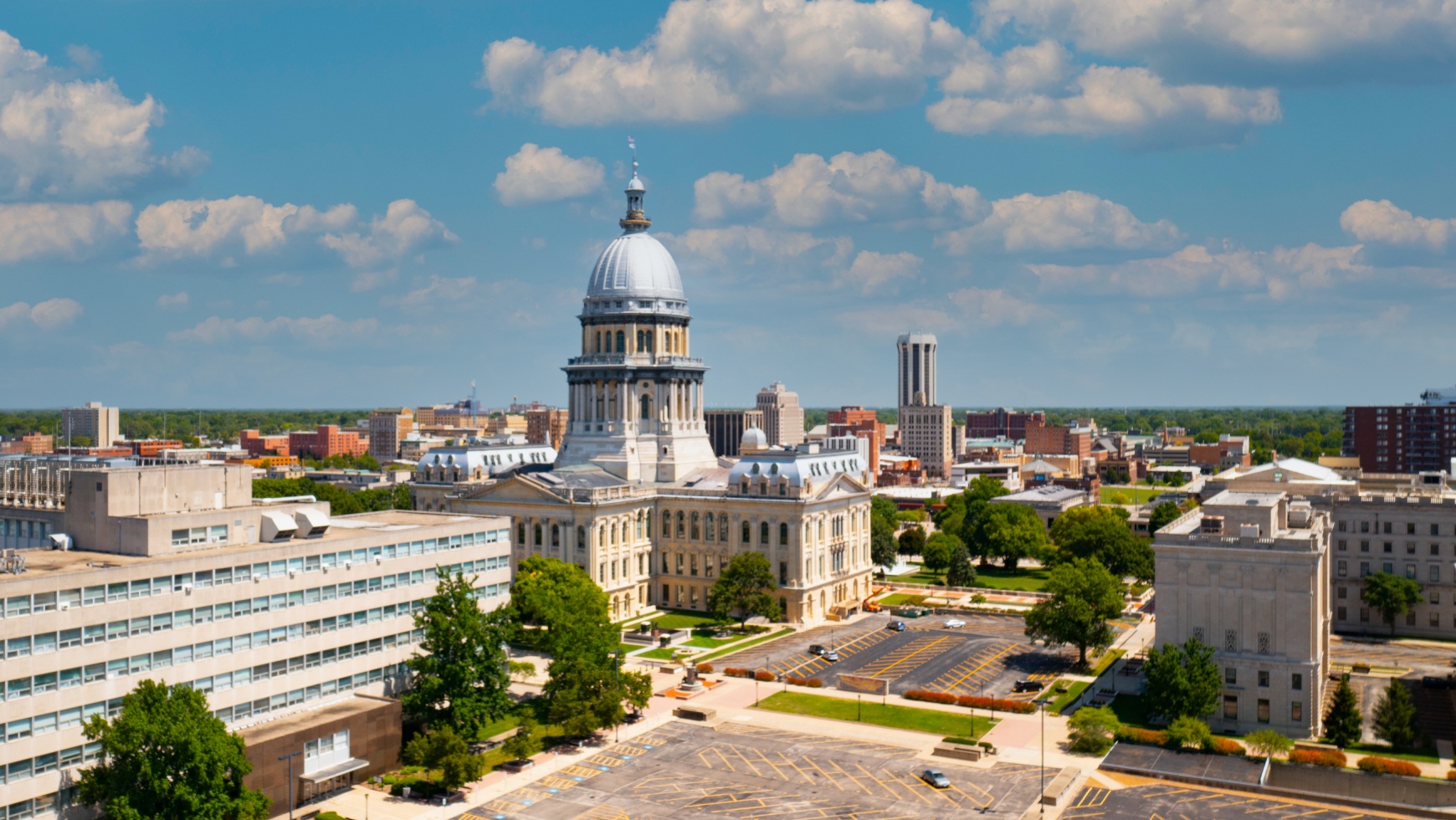
Second cohort of Accelerate Illinois Broadband Infrastructure Program selected
Heartland Forward and the Benton Institute for Broadband & Society today announced the six communities selected to participate in the second cohort of the Accelerate Illinois Broadband Infrastructure Planning Program, which is administered in partnership with the Illinois Department of Commerce and Economic Opportunity (DCEO). The newest cohort of participants include: Bond County, Kankakee County/Pembroke CDC, Kaskaskia College area, Livingston County, Ogle County and Peoria/Woodford Counties.
Building on the success of the first cohort, which included the City of Springfield, Jackson County, Knox County, Mercer County, Whiteside County and the Village of Elsah, the second cohort will participate in a 14-week intensive training program to help leaders from participating communities develop broadband plans to address their unique local needs. The training will position them to effectively leverage newly available state and federal broadband infrastructure funding.
Read MoreIn The News • May 4, 2022

Fast Company recognizes the American Connection Corps on their annual list of World Changing Ideas
Launched in 2021, the ACC, a pillar of the American Connection Project, builds capacity in communities to get better connected to broadband internet in an increasingly digital world
Read MoreBlog Post • March 16, 2022

Focus on a Fellow: Liz Lima
The Federal Communications Commission (FCC) recently launched the Affordable Connectivity Program (ACP), a permanent replacement for the Emergency Broadband Benefit (EBB) which launched during the pandemic using emergency COVID funds. While the programs are slightly different, the goal is the same – help close the digital divide that persists across our country by getting people connected to affordable internet service.
As an American Connection Corps Fellow placed with Rural LISC in Central Ohio, Liz Lima has already made an impact on this front by working to understand the lessons learned from the EBB to help increase enrollment in the ACP. She recently spearheaded the creation of an innovative mapping tool that overlays enrollment data from the EBB with census data on the communities that have the highest levels of eligibility for the program. This tool can help target outreach for the ACP by pinpointing the communities where large populations of people are likely eligible for the program, but haven’t yet taken advantage of it.
Liz had the opportunity to present this tool to the FCC, which, in her words, was “surreal.” She hopes that this tool will benefit communities as they work to get their residents connected: “The goal of the map is to help local governments, organizations and Digital Navigators see how EBB has impacted their community, who all is eligible, and where ACP outreach is needed most,” she said.
Another aspect of Liz’s work with Rural LISC is supporting their Digital Navigators program, which in just a year and a half has served about 2,000 clients and distributed nearly 1,000 devices. In addition to helping clients access connections and become familiar with devices, Digital Navigators train individuals in basic computer skills and provide regular follow-ups to meet their needs, on client timeline.
Liz is most proud of how this work has impacted people who might not typically be thought of as lacking digital literacy. “The average age of our clients is 42 years old and the median is 39…but you hear a lot about the term ‘digital skills’ and we assume that it’s a lot of elderly individuals who have a digital skills gap, when in reality, it’s working-age who adults need this assistance too,” she said.
Liz credits her placement with Rural LISC for increasing her awareness of the issues around internet connectivity, and granting her a greater understanding of the challenges facing the heartland. She added, “You take for granted having your bills on autopay or being able to jump online quickly – you have this mentality of, who doesn’t have the internet? But it’s millions of people.”
Here at Heartland Forward, we’re proud of the important and innovative ways in which Liz and our other American Connection Corps Fellows are working to connect the heartland and close the digital divide.
Press Release • February 28, 2022
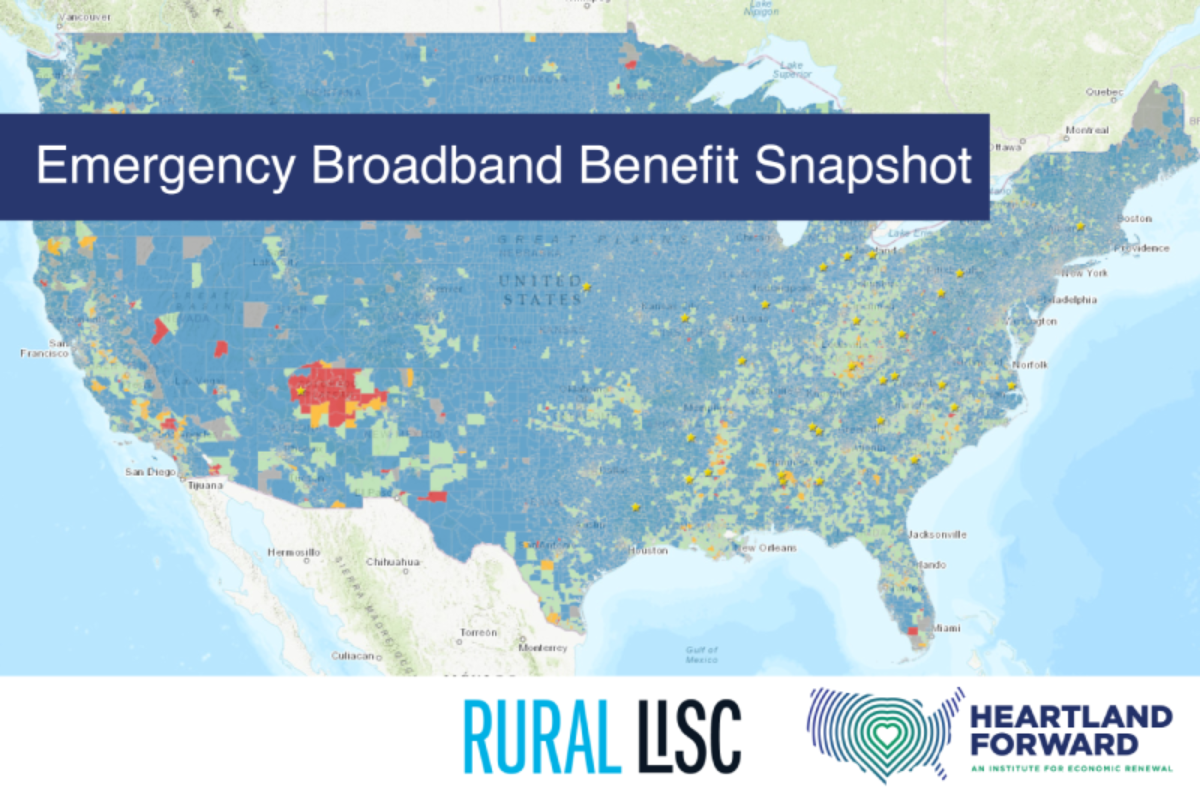
Rural LISC Partners With Heartland Forward To Map Uptake In Emergency Broadband Benefit, Help Target Outreach For New Federal Affordable Connectivity Program In 2022
Today, Rural LISC launched a new tool developed in collaboration with Heartland Forward that maps 2021 enrollment in the Federal Communications Commission’s (FCC) Emergency Broadband Benefit (EBB) Program and helps target enrollment efforts for the new Affordable Connectivity Program (ACP) that replaced EBB at year’s end. The mapping tool, built by Liz Lima, a current American Connection Corps Fellow sponsored by Heartland Forward, is designed to aid Rural LISC digital navigators and other partner organizations in identifying the communities that can benefit most from outreach and awareness of the new federal discount on internet service for low-income households.
Read MoreIn The News • February 25, 2022

Program expands broadband internet in Illinois
Illinois is moving forward to expand access to broadband in the state, with Jackson County one of six communities in the initial launch. It is called the Accelerate Illinois Broadband Infrastructure Planning Program. It helps develop high-speed internet plans based on local needs and will help expand access to certain residents. Hosted in collaboration with Heartland Forward and the Benton Institute for Broadband & Society, the six communities are the City of Springfield, Jackson County, Knox County, Mercer County, Whiteside County, and the Village of Elsah.
Read MoreIn The News • February 24, 2022

Gov. Pritzker Announces Inaugural Cohort Of Accelerate Illinois Broadband Infrastructure Program
Governor JB Pritzker and the Illinois Department of Commerce and Economic Opportunity (DCEO) Office of Broadband announced today the six communities selected to participate in the inaugural cohort of the Accelerate Illinois Broadband Infrastructure Planning Program. Hosted in collaboration with Heartland Forward and the Benton Institute for Broadband & Society, the six communities are the City of Springfield, Jackson County, Knox County, Mercer County, Whiteside County, and the Village of Elsah.
Read MoreIn The News • January 24, 2022
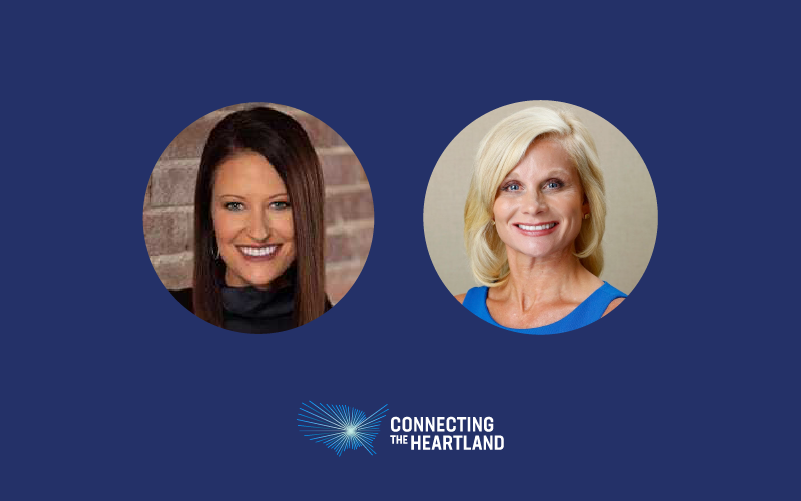
Opinion | It’s essential for Tennessee to use historic internet access funding effectively
Tennessee will receive funds in the coming months that have the potential to truly transform the lives of the more than 492,000 Tennesseans who currently lack adequate internet access and boost the future economic potential of our state.
Read MoreIn The News • January 19, 2022
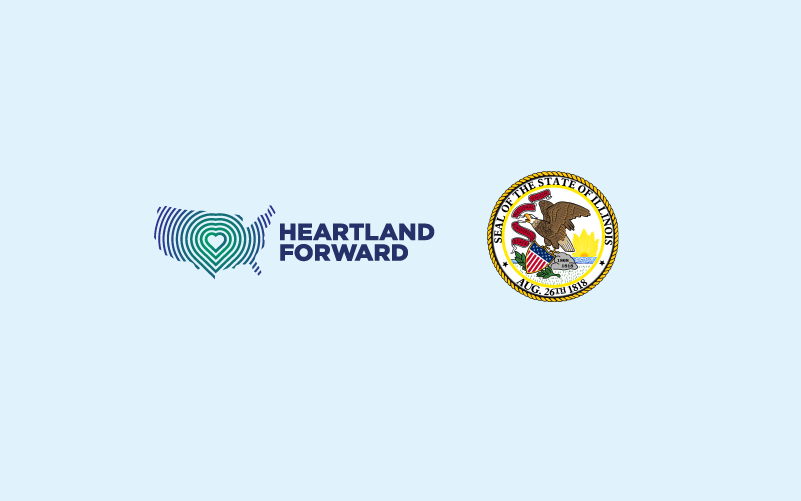
Illinois communities getting broadband infrastructure assistance
Illinois communities are preparing for a broadband infrastructure investment after Governor J.B. Pritzker announced last month they’re pushing for internet access to all communities in the state. This is the Accelerate Illinois program, led by the Illinois Office of Broadband and the Benton Institute and funded by Heartland Forward.
Read MoreBlog Post • January 12, 2022

Focus on a Fellow: Carly Fitz
Access to high-speed internet is as essential for life in the 21st century as basic utilities like water, gas or electricity. In her placement as an American Connection Corps Fellow, Carly Fitz has seen how residents of rural Perry County, Ohio are falling behind due to their lack of access to affordable internet. In her fellowship role as an Access Specialist for Perry County with the Buckeye Hills Regional Council, she hopes to change this and bring economic renewal to the region through improved high-speed internet access.
When starting in her position, it became clear that existing data documenting regional internet access capacity and connection speeds was outdated and did not accurately reflect the needs of Perry County. To address this, Carly traveled throughout the region to educate residents on how to perform internet speed testing and she distributed 1,850 flyers to homes in the area to encourage them to take the speed test. This was key to ensuring that the Buckeye Hills Regional Council had the most up-to-date connectivity data to identify the areas of greatest need. Equipped with this new information, Carly was ready to get to work.
As a critical next step, Carly created a Broadband Advisory Committee in Perry County, consisting thus far of 15 representatives from the local libraries, schools and other development organizations. The new organization will hold its first meeting in January 2022 and will help shape the county’s connectivity future.
The committee has three subcommittees to effectively tackle the different needs and challenges of the region as they arise. The infrastructure subcommittee will focus on expanding broadband infrastructure through collaboration between funders and internet service providers. Once the needed infrastructure is in place, the affordability subcommittee can work to increase access to affordable at-home connections through federal grants and through initiatives like those of the nonprofit, PCs for People. Finally, once affordable access is established, the digital literacy subcommittee will work to ensure that residents are equipped with the knowledge and tools needed to get online in their daily lives. One specific initiative Carly hopes to continue under the committee’s direction is an effort to connect Perry County senior citizens with high school seniors to learn basic computer and technology skills.
In addition to her work to create a Broadband Advisory Committee, Carly contributed to several other important efforts in the county. By working with local internet service providers, she was able to encourage the development of new lines that brought service to 500 previously unserved households. Furthermore, Carly’s efforts to identify the areas of greatest need in the region helped internet service providers reach 9,450 new applications for the Ohio Residential Broadband Expansion Grant Program. She has also supported a local fiber technician training program (part of the state’s efforts to build up the internet infrastructure workforce) and hopes to continue to expand those efforts.
When Carly began her fellowship, one of her primary goals was to be hyper-local in her efforts, saying, “I think that the way to be successful with this effort is to connect small areas with the greatest need slowly. I’m trying to take these little pockets in the county that need local phone service as well as high-speed internet and connect all of those areas to each other.” She hopes that her work can contribute to not only the growth of the county’s economy, but also its sense of community. Heartland Forward is excited to see what Carly and all of our American Connection Corps fellows can accomplish in their work to bridge the digital divide.
Blog Post • November 19, 2021

Focus on a Fellow: Mary Gay
Following the passage of the bipartisan infrastructure bill –– communities across the country and in the heartland will start to receive an unprecedented amount of funding to close the digital divide. Even with the $65 billion in funding, important challenges remain –– these funds must be effectively disseminated to maximize the impact in the communities that need it most. That’s why Mary Gay’s role as a Heartland Forward American Connection Corps fellow working for the Leadership Council Southwestern Illinois is so crucial.
Mary made the decision to serve as a fellow, in the area where she went to college, following her graduation from Washington University in St. Louis. She was excited for the learning opportunity her fellowship provided, saying, “Even though I came into this position not knowing a lot about broadband, the pandemic made it clear how vital strong internet connection is to thrive in today’s world. The more I learn about it the more motivated I am to make change in this area as a fellow.”
In her role at the Leadership Council, Mary helps implement the Illinois Connected Communities Strategic Plan Key Regional Priorities. Specifically, she is spearheading the development of a broadband grant “war room” from which the Leadership Council can identify funding sources, timelines and criteria for available grants to expand broadband access.
Through this work, Mary created a page on the Leadership Council website called “Broadband Funding Opportunities.” She keeps the website updated with available broadband grants found through research. This first of its kind, one-stop shop for the community provides background on who is providing the funding, eligibility requirements, relevant dates, award details and supporting information about the grant and sponsoring organization. The website also has additional resources, including federal grant-finding tools, information on broadband issues, and links through which individuals can find affordable internet in their community.
This tool aims to address the needs of organizations in Illinois’ Metro East region by providing a centralized location for individuals and organizations to access funding opportunities. While the Leadership Council is locally focused, the list Mary created predominantly outlines federal funding that’s available to states beyond Illinois, making it a valuable tool for organizations across the country.
Mary’s motivation for creating this tool comes from issues she identified in the grant-seeking process. “I think it is important to have a place where people interested in pursuing broadband related projects can go to look for funding easily,” Mary says. “It is a time-consuming process, and having a list in one place where people can see immediately if they are eligible, how much they can get, and what it is for, will save them a lot of time.”
In the short time this new resource has been up and running, stakeholders in the region have utilized it to easily locate and apply for grants to receive funding for broadband projects. Mary plans to continue updating the website throughout the duration of her fellowship with available opportunities. Her work will remain a resource for the region to ensure no available opportunity to connect more people with broadband goes unnoticed, and Heartland Forward is proud to support her work.
Blog Post • November 15, 2021

Four Principles to Maximize the Impact of Federal Spending on Connectivity in the Heartland
By: Angie Cooper, Chief Program Officer of Heartland Forward
The recent signing of the federal infrastructure package is welcome news in the fight to close the digital divide across the heartland. Containing billions of dollars in funding to expand broadband access across the country, this legislation holds great promise to improve life for everyday Americans — especially the estimated 40 million Americans who still lack access to the reliable, affordable high-speed internet needed to participate fully in our digital age. Now the real work begins to make sure every dollar is spent efficiently and in service of the communities it’s intended to help.
In light of historic investments in high-speed internet, the question of closing the digital divide has shifted from “Where will we find the resources?” to “How can we most effectively deploy the resources we have?” With the risk of accidental overlap and waste, ensuring that the funding allocated in the recently passed federal infrastructure bill reaches the people who need it most will require an unwavering commitment to the public good and strategic, ongoing coordination between local, state and federal stakeholders.
Since Heartland Forward launched our Connecting the Heartland initiative to help close the digital divide, we have had the opportunity to engage with policymakers, subject matter experts, community leaders, digital equity advocates and residents across the heartland. We feel their hope and optimism for a not-too-distant future where every resident has access to high-speed internet at a price they can afford, and the skills and know-how to take full advantage of the opportunities that come with connectivity. We also sense their fear that some communities will be left behind if we are not intentional about how we move forward in this historic moment.
To that end, our work through Connecting the Heartland in the coming months and years will be anchored in four guiding principles:
- Public investments in high-speed internet should lift everyone up. The long-term success depends on having consumers who can afford the service, understand and trust its relevance for improving their lives and the skills to know how to use it.
- Communities should drive solutions that meet their own unique needs. Too many communities, especially smaller ones, are not currently prepared to leverage new funds to bring connectivity to their communities. They need to be empowered with independent information, expertise and authority to develop plans based on their own local needs and circumstances.
- Regulations and standards should maximize today’s investments for long-term impact. The amount of funding and post-pandemic momentum we are seeing now is not likely to be repeated in the decades ahead. This is a once-in-a-lifetime moment to make sure every household has access to internet service that can facilitate full participation in the digital world. Regulations and standards should be designed to encourage maximum efficiency in the deployment process, transparency and speeds that will meet tomorrow’s needs.
- Access to high-speed internet will positively impact our economy. As ambitious and urgent as the need to close the digital divide is in the heartland and across America, this moment provides an opportunity to do even more. Public funds spent to increase access to internet service can serve double-duty in addressing other needs, from healthcare quality and access, to education and training, to job creation.
There is hard work to be done to put these principles into action. But the clock is ticking, and the stakes have never been higher. We know it will take commitment and collaboration across all sectors and all levels of government. We are ready for the ground game in our states and communities. We invite other organizations and policymakers to join us.
In The News • November 4, 2021

‘Not a Pipe Dream’: New Report Offers Roadmap to Eliminate Internet Affordability Gap for Students
Almost two years into the pandemic, over 18 million households lack high-speed internet access. Even if it’s available, they can’t afford it, according to a new report released Thursday from nonprofit EducationSuperHighway.
In Little Rock, Arkansas, Maddie Long is already doing that work [to expand access]. Heartland Forward, a think tank focusing on the needs of states in the middle of the country, is funding the position to help reduce the digital divide.
Read MoreIn The News • November 4, 2021

Nonprofits Partner to Enroll Latinos in FCC Broadband Program
Heartland Forward and the League of United Latin American Citizens on Thursday announced they will partner to help Latinos sign up for a Federal Communications Commission broadband benefit program as enrollment lags.
Read MorePress Release • November 4, 2021
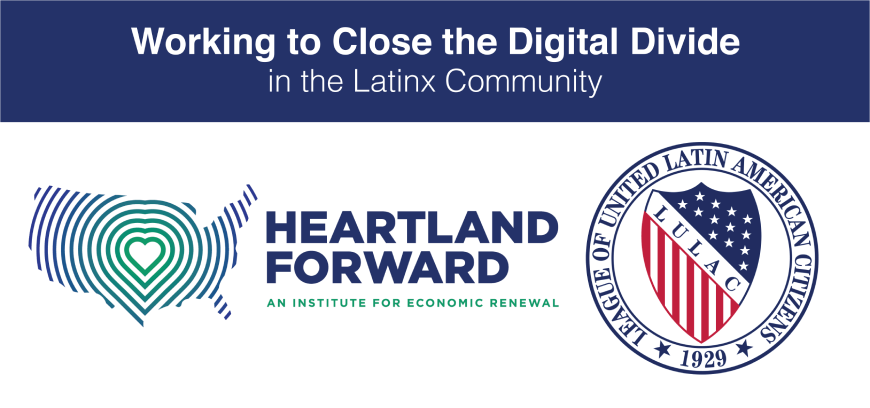
Heartland Forward and League of United Latin American Citizens Announce Partnership to Increase Latino Enrollment in Emergency Broadband Benefit [English/Spanish]
Heartland Forward and the League of United Latin American Citizens (LULAC) announced a new partnership to lead on-the-ground advocacy and enrollment efforts to help connect Latino households to affordable internet through the Federal Communications Commission’s (FCC) Emergency Broadband Benefit (EBB) Program. The collaboration includes $50,000 in funding from Heartland Forward for LULAC to distribute on-the-ground outreach and enrollment activities to its local councils across the heartland states.
Hoy, Heartland Forward y la Liga de Ciudadanos Latinoamericanos Unidos (LULAC) anunciaron una nueva colaboración para liderar los esfuerzos en promover e inscribir a hogares hispanos para servicios de Internet a través del Programa de Beneficios de Banda Ancha de Emergencia (EBB, por sus siglas en inglés) de la Comisión Federal de Comunicaciones (FCCc, por sus siglas en inglés). La colaboración incluye una contribución de $50,000 de Heartland Forward para que LULAC lo distribuya a sus consejos locales en los estados del llamado “heartland” o corazón del país, para actividades de promoción e inscripción.
Read the Press Release Leer el PDFIn The News • October 14, 2021

#TurnThePageProject featured Hosea Born: Lead For America and Heartland Forward American Connection Corps Fellow
The #TurnThePageProject featured Hosea Born, an American Connection Corps Fellow supported by Heartland Forward and Lead For America, in an interview about the intersection of education and the digital divide.
In The News • September 30, 2021

Little Rock Partnership with FCC Program Bringing More Accessible Broadband to Those in Need
A partnership was announced between the Southwest Community Center, the City of Little Rock, Little Rock School District (LRSD), Central Arkansas Library System (CALS), and the nonprofit Heartland Forward to increase awareness and enrollment in the Emergency Broadband Benefit.
Read MoreIn The News • September 30, 2021
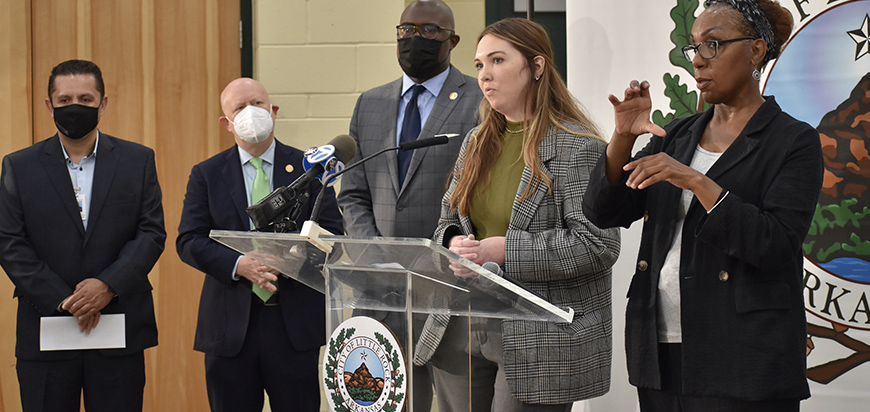
Little Rock School District, Mayor Partner to Increase Access to Broadband
The City of Little Rock, the Little Rock School District, Central Arkansas Library System, and nonprofit Heartland Forward are working together to increase awareness for the Emergency Broadband Benefit program.
Read MoreIn The News • September 23, 2021
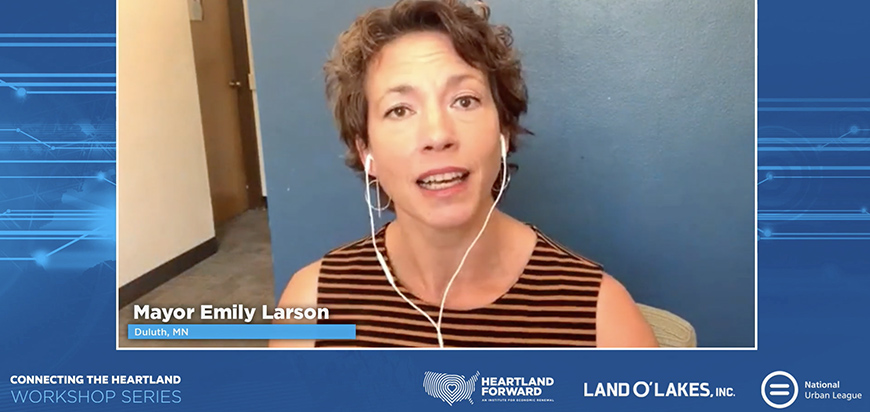
Duluth Mayor Strategizes with Other City Leaders Nationwide to Improve Broadband Service
Mayor Emily Larson joined a national panel of mayors at the Heartland Forward Connecting the Heartland Workshop to discuss both the challenges and opportunities cities face at this moment in bridging the digital divide.
Read MoreIn The News • September 22, 2021
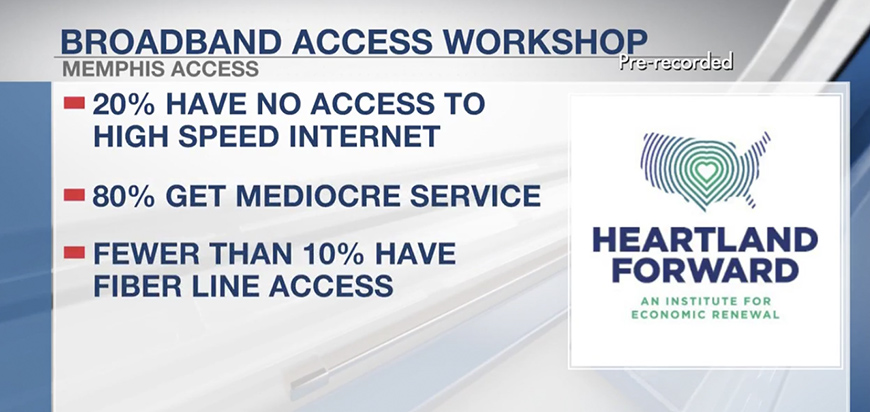
Memphis Mayor Says Improving Broadband Access Is A Top Priority
Memphis Mayor Jim Strickland took part in the Connecting the Heartland Workshop hosted by the group, Heartland Forward. When it comes to broadband access in the Bluff City, Strickland says 20 percent of Memphians do not have access to high-speed internet, and the 80 percent who do have access get mediocre service.
Read MoreIn The News • September 2, 2021
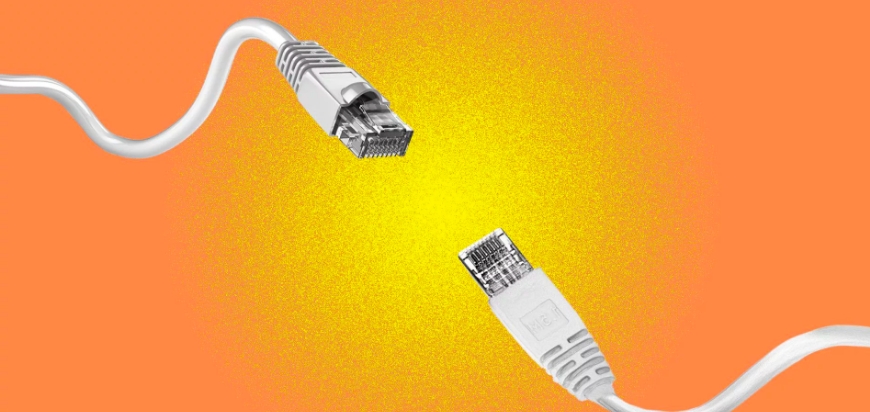
Axios: Arkansas campaign aims to get more people discounted internet
A coalition of groups across the state are launching a public awareness campaign to get more Arkansans access to discounted internet thanks to a relatively new pandemic-era program….
Read MoreBlog Post • June 14, 2021

How Heartland Forward is Doing Our Part to Bridge the Digital Divide
Heartland Forward is launching an awareness campaign to spread the word about the program and get internet service to those who need it at home.
Read MoreIn The News • June 14, 2021

NPR: FCC Temporarily Offering Up To $50 A Month For Low-Income Americans To Access Internet
In an effort to close the so-called digital divide, the Federal Communications Commission is temporarily providing low-income Americans discounted Internet access
Read More